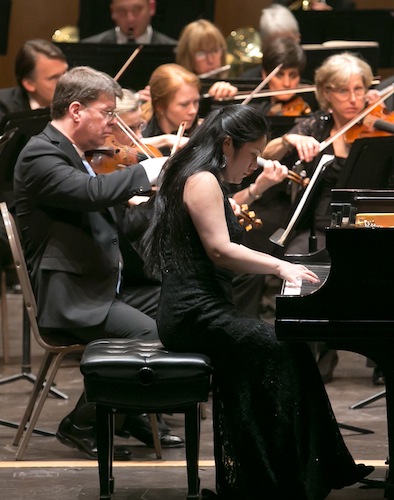Chicago Philharmonic lives up to its “Orchestra of the Year” award in Russian program
It was somewhat ironic that the Chicago Philharmonic was given an award that noted its innovative programming at a concert that was one of the ensemble’s most traditional in years.
Still, the award as Illinois Professional Orchestra of the Year, presented by Susan Lape of the Illinois Council of Orchestras Sunday afternoon at the Philharmonic’s concert in Skokie, was surely well deserved.
Less than a decade ago, the ensemble was hovering on the edge of bankruptcy. Today, the Philharmonic has turned the financial ship around, running a surplus for the past seven seasons. Artistically, the ensemble has been equally laudable. Under Scott Speck’s leadership, the Philharmonic has offered consistently well-played, adventurous, often quirky programs. They have also expanded their audience base to multiple venues in Chicago and the suburbs, as well as introducing a chamber music series. And this week, Speck and a Philharmonic chamber group are in Poland for an international music exchange, performing music of American composers.
Sunday’s program of two Russian blockbusters, performed at the North Shore Center for the Performing Arts, may have been more populist than most served up by Speck since he took the reins as the Philharmonic’s artistic director five years ago. But the performances showed the partnership in fine fettle with Speck’s reliable podium direction eliciting largely superb playing from the orchestra.
When was the last time you heard Tchaikovsky’s Symphony No. 5 on the first half of a program? Speck led a well-paced performance–spacious in the lugubrious fate-laden opening bars of the first movement, with the ensuing development dramatic and incisive. Neil Kimel lofted a noble horn solo in the Andante and the waltz went with the lilting grace one would expect from a conductor who also leads the Joffrey Ballet.
The Skokie venue is a drier room than the Philharmonic’s usual Pick-Staiger home in Evanston, which was noticeable in the raspy edge to the brass and a lack of amplitude and warmth in the strings. Yet even so the final movement was undeniably fiery and exciting. One can quibble that Speck’s burst of acceleration in the final bars was a bit of lily-gilding but this was on the whole a strong, idiomatic and impassioned Tchaikovsky performance.
Another Russian warhorse followed after intermission with Rachmaninoff’s Piano Concerto No. 2. Yet here the results proved more mixed.
Soloist Xiayin Wang clearly possesses an imposing technical arsenal. In Sunday’s nervy performance the pianist seemed determined to deliver as blindingly virtuosic a Rachmaninoff outing as possible. With blistering tempos, she managed to hold the score together, though not without some minor digital slips en route.
Yet ultimately Wang’s steely, aggressive performance seemed too hard-edged and unyielding for the music. Concert tension is usually a good thing but Wang rarely relaxed enough to give the score’s lyrical moments their due. The exception was the closing section of the Adagio, which the pianist rendered with a more tender, inward touch. (Speck ensured the strings played their echoing phrases with similar gentleness.) More moments like that from Wang would have made for a more balanced and successful performance.
Though Sunday’s “Beyond the Black Sea” program largely hewed to the popular side, Speck managed to provide some repertorial topspin with the opening work by Philip Glass.
For all his popularity, Glass’s orchestral music remains grievously neglected on the local scene. The Chicago Symphony Orchestra, amazingly, has never played a note of Glass’s music downtown.
So credit to Speck for starting off the concert with music from Glass’s score for the 1996 film, The Secret Agent. The selection sort-of lined up with the Russian theme by virtue of the movie’s milieu and the source novel from Joseph Conrad.
Glass extracted Three Pieces, a mini-suite from his score, and Speck gave us just the first and last items (“Secret Agent” and “Secret Agent Ending”), which worked well enough. The music offers Glass in characteristic pulsing minimalist mode, rising to a surprisingly rich Romantic outpouring. The music was deftly directed by Speck and well played by the musicians. Cellist Barbara Haffner and English hornist Anne Bach provided first-rate obbligato contributions in the neo-Baroque solos that frame the music.
The Chicago Philharmonic presents “The Dream,” a concert with Visceral Dance Chicago 3 p.m. April 29 at the North Shore Center for the Performing Arts in Skokie. chicagophilharmonic.org
Posted in Performances




